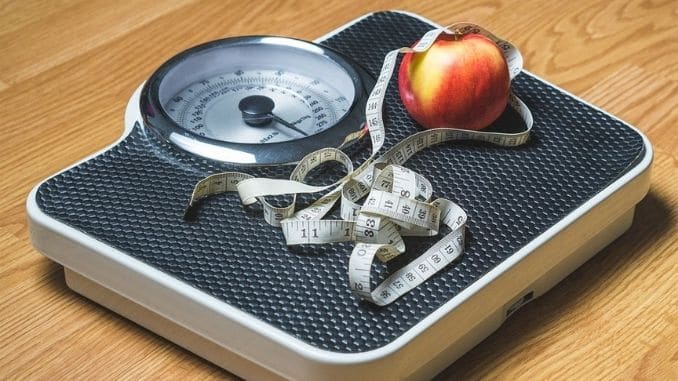
If you think you’ve gained some weight over the past winter, you’re probably right.
It’s just too easy to pack on the pounds when it’s cold and dark outside. We’re not as motivated to exercise and the short days encourage cravings for sweets, carbohydrates, and high-calorie comfort food.
On top of that, we miss the sun. According to a recent study, blue light emitted by the sun shrinks fat cells lying just under the surface of the skin. Those blue light wavelengths penetrate the skin, hit the fat cells and reduce their size, encouraging reduced fat storage overall.
A lack of sun exposure, therefore, may promote weight gain. “If you flip our findings around,” said senior author Peter Light, “the insufficient sunlight exposure we get eight months of the year living in a northern climate may be promoting fat storage and contribute to the typical weight gain some of us have over winter.”
So, it’s not all because of those holiday treats that you’re packing around a few extra pounds. Regardless, if you don’t do something to get rid of them, you could be blessed with them forever.
Studies consistently show that as we age, we tend to gain weight gradually at a rate of one to two pounds a year. In one investigation involving more than 120,000 people, scientists found that within each four-year period, participants gained an average of 3.35 pounds.
That means if we want to maintain our figures, we’ve got to get busy as spring comes around. Below, we’ve got seven easy ways to reverse that winter weight gain and feel more like yourself again.
7 Easy Ways to Reverse Winter Weight Gain
1. Get More Sunshine
Based on the study above, getting more exposure to the sun may be one of the best ways to reduce winter fat. Try getting out for a walk or picnic lunch between the hours of 10 a.m. and 3 p.m. when it’s warmest and when the sun is most intense.
Watch your skin — when it starts to get warm or turn a little pink, you’ve been out long enough. After that, you need protection to avoid premature aging and sunburn.
2. Get More Natural Light Into Your Day
Even if you get out for 20 to 30 minutes once a day, that may not be enough to tell your body it’s time to wake up to the new season. Recent research has connected our circadian rhythms — or body clocks — to weight gain, and those rhythms are tied into natural light exposure.
Getting more light throughout the day can help support your natural body clock, which can improve sleep, boost energy and, ultimately, help you lose weight. First thing in the morning, open the blinds and try to get out under the open sky for at least a few minutes. Then, work near a window if you can or do your best to get outside a few times a day just to let the sun work its magic on you.
3. Get 7 to 8 Hours of Sleep
Studies have found that the more sleep you lose, the more likely you are to pack on the pounds. In 2016, researchers reported that sleep deprivation changed appetite and energy levels, sparking a desire for tasty foods. Those who had their sleep restricted consumed more and unhealthier snacks between meals, in response to changes in the brain driving eating behaviors.
Other research from the University of Colorado showed that one week of sleeping about five hours a night led participants to gain an average of two pounds. Sleep deprivation reduces the hormone leptin, which suppresses the appetite and increases levels of ghrelin, which triggers feelings of hunger. We’re left helpless to stop ourselves from eating more than usual.
Sleep is critical, so to improve yours, go to bed and get up at the same time every day and night, keep your room cool and dark, remove all technology from your bedroom, including cellphones, computers, tablets, and televisions, and practice a before-sleep ritual that helps you relax.
4. Eat Within a 12-hour Period
Limiting your eating times to a 12-hour period can help you drop that winter weight quickly. It’s called “time-restricted” eating and, in a way, it’s similar to going on a mini-fast without having to cut back on calories purposely.
Studies have found that this method can be very effective. You eat whatever you want between the hours of say, 8 a.m. to 8 p.m., then you don’t eat anything again until 8 a.m. the next morning.
Researchers from the Salk Institute in the United States found that subjects on this sort of restricted-eating plan were healthier and slimmer than those allowed to eat whenever they wanted — even though both groups consumed the same number of calories. Another group that started out obese lost five percent of their body weight within just a few days of starting on a time-restricted diet and, at the end of 38 weeks, were 25 percent lighter.
If you’ve never tried this before, start gradually. Begin with a shorter fasting period and then lengthen it gradually. Try eight hours at first, then increase it by 30 minutes every few days until you reach 12. You can choose the hours that work best for you, but once you do, try to stay consistent.
5. Increase Your Activity Level ― Just a Little
Although there are other factors at work causing winter weight gain, activity levels tend to drop just a little during the winter months too. Some people can keep their workouts going strong, but many of us find ourselves backing off just a little bit. Therefore, when spring comes around, we have to make a conscious effort to step it up again.
The best way to do this is with little changes throughout the day. As the weather gets nicer, take a walk during your lunch hour or after work. Get up and walk around more often during the day. Keep a jump rope at your desk and use it two to three times during the day. Extend your workout by five to 10 minutes. Choose one to two nights a week to go to the park or play an outdoor game with the kids.
The more ways you can find to increase movement, the easier it will be to get rid of that winter weight.
6. Recommit to Stress Relief
Stress is strongly connected to weight gain. Recent studies show that when we’re stressed, the body releases more glucocorticoids — hormones that change cells into fat cells. When we’re under prolonged periods of stress, more of our cells become fat cells, and we gain weight.
Other studies have found a connection between the stress hormone cortisol and weight gain. They’re not sure yet whether weight gain leads to increased cortisol levels or if increased cortisol leads to weight gain, but there is a connection. Some research has also shown that higher cortisol levels were associated with the most dangerous kind of weight gain — that which occurs around the abdomen.
Stress relief, then, is important when trying to lose weight. An exercise is a great option as it reduces stress and helps burn calories at the same time, but other methods work well too, including yoga, tai chi, meditation, journaling, pet therapy, crafting, time with friends and other activities that help you relax.
7. Drink More Water
It’s harder to get all the water we need during the winter months as the cold temperatures tend to throw off our natural thirst response. If you start drinking now, however, you may find that losing weight is easier than you thought it would be. Water can help in a number of ways:
- Helps you eat less at meals. If you drink a full glass before a meal, it can help you feel full so that you eat fewer calories. In a 2014 study, overweight women who drank two cups of water before each meal not only lost weight, but they also lost body fat and reported that they didn’t feel as hungry.
- Helps you avoid snacking. Water acts like a natural appetite suppressant. When you feel hungry, try drinking a full glass before you reach for a snack.
- Boost metabolism. Water may help increase the number of calories your body burns. Scientists found that drinking cold water or even water at room temperature increased energy expenditure, causing participants to burn a few more calories than usual for 90 minutes afterward.
- Improves digestion. Water helps flush waste out of the body, improving digestion and reducing the risk of bloating.
- Makes a better weight-loss beverage. If you replace even one high-calorie drink with water, you’ll boost your weight-loss results. In a 2015 study, women who drank one cup of water after lunch each day during a period of 24 weeks lost 13.6 more weight than women who drank the same volume in diet beverages after lunch.
- Helps burn fat. There is some evidence that we need water to burn fat. In a 2016 review, scientists found that increased water intake was associated with loss of body weight because it helped decrease appetite, but also because it increased “lipolysis,” which is the process by which the body breaks down fats.
Are you getting enough water? According to a 2013 study, maybe not. Scientists found that 42.7 percent of men and 40.6 percent of women between the ages of 20 and 50 were not meeting their daily fluid recommendations.
Shoot for at least eight glasses of water a day and eat more water-rich foods like stews, soups, berries, grapes, melons, tomatoes, celery, cucumbers and greens.
If you want to lose weight in a safe, joint-friendly way, then check out the Low-Impact High-Result Workout program.







